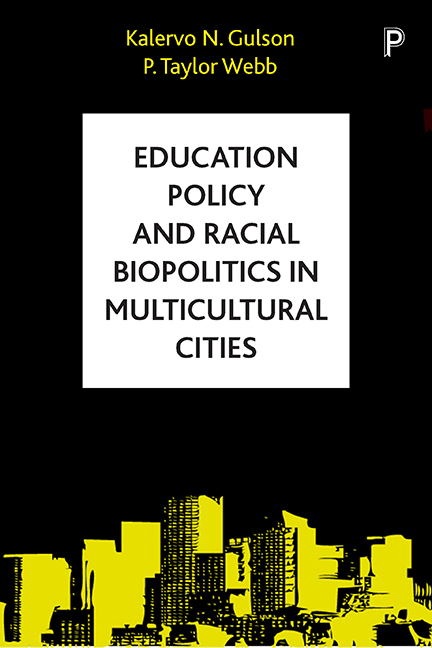Book contents
- Frontmatter
- Contents
- Notes on authors
- Acknowledgements
- Foreword
- Introduction: education policy and multicultural cities
- One Policy events
- Two Policy and biopolitics: the event of race-based statistics in Toronto
- Three The (micro)politics of racial neoliberalism With Viviana Pitton
- Four ‘Up in the northwest corner of the city’: the city, race and locating the school
- Five Difference and recognition
- Six Policy events, race and the future of the city
- References
- Index
Four - ‘Up in the northwest corner of the city’: the city, race and locating the school
Published online by Cambridge University Press: 05 April 2022
- Frontmatter
- Contents
- Notes on authors
- Acknowledgements
- Foreword
- Introduction: education policy and multicultural cities
- One Policy events
- Two Policy and biopolitics: the event of race-based statistics in Toronto
- Three The (micro)politics of racial neoliberalism With Viviana Pitton
- Four ‘Up in the northwest corner of the city’: the city, race and locating the school
- Five Difference and recognition
- Six Policy events, race and the future of the city
- References
- Index
Summary
Once the Toronto District School Board (TDSB) supported the establishment of an Africentric Alternative School, the event of becoming-school added an additional layer of spatial or locational politics. Like the years preceding the deciding vote at the TDSB, the question of where the school would be located would be become part of the race politics of the city.
The politics involved in the selection of a suitable location for the school would naturally appear to be the culminating event, following the political and entrepreneurial activities identified in the preceding chapters. This chapter, therefore, appears to be chronologically, the obvious one to be a last chapter in research on policy ‘implementation’. For instance, if the school was not approved by the board, then there would be no discussion about where to locate the school.
However, our argument is based upon the idea that the question of location affected the entire process of the becoming of the school rather than just at the ‘end’ of a sequential process. The question of location ‘haunted’ trustees and community members prior to any governance and policy-development activities designed to produce the school. The city of Toronto was powerfully shaped by various racial, spatial and economic factors that functioned as strong preconditions for the becoming of the school. In fact, the question about ‘where to put the Black school in the White city’ would produce strong feelings across Toronto, given its long and troubled histories with placements of non-White populations (and their placements in relation to each other). As such, we have decided to place this chapter in ‘the middle’ of the book in order to illustrate how the city powerfully influenced the becoming of the school.
In this chapter we examine the event of finding a location for the school, and the connections between the ways in which the city was (and is) racialised and undergoing urban change around gentrification and ‘rebranding’ of neighbourhoods. We examine the connections between education policy, cities and the new forms of suburbia in multicultural cities.
The search for a home
On 2 April 2008, during a meeting of the Program and School Services Committee (PSSC), members of the Africentric School Support Committee (ASSC), including Donna Harrow, Emanuel Wanzama and Leslie Moody, presented an update on the Africentric Alternative School proposal.
- Type
- Chapter
- Information
- Education Policy and Racial Biopolitics , pp. 77 - 96Publisher: Bristol University PressPrint publication year: 2017



